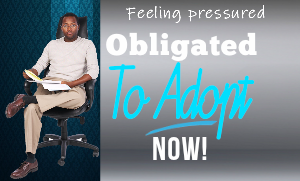
Adopting a child is a personal decision and one that should take serious thought. No one else can tell you if you should adopt or should not adopt. No one should make you feel obligated to adopt a child. People who know you well, can certainly weigh in and help with such an important decision, and those who have adopted a child can give you insight on what to expect and their thoughts based on their own experiences and education, but no one should make you feel obligated to adopt.
Many people feel obligated to adopt because their case worker:
- Tells you your child has a sibling and if you are not going to adopt this child soon, they will take the child to live with siblings. Your child may not have any siblings.
- Explains RAD (Reactive Attachment Disorder) to you and tells you that if you do not adopt this child, the child will struggle with RAD. The child probably already struggles with attachment issues such as RAD. That may be your hesitancy in the first place. You should never be guilted into adopting a child anyway. Most of the time, the same case workers explaining RAD, are not educated in RAD and know very little about it.
- Threatens you that they will take the child from you if you do not adopt soon because the child is at the perfect age to be adopted and each month that goes by, makes it more difficult for them to be adopted by someone else.
- Dismisses the issues that you are currently having with your child, saying that adoption will give the child security and structure, and the behaviors will decrease and probably go away. Any issues that you are having now with the foster child, you will continue to have after adoption and due to the threat of bonding and the fear of relationships, the issues will most likely increase.
Foster care and adoption is all about the money and closing cases. They are funded by the state and given incentives for adoption. That is not to say that there are not case workers who truly care about the children on their caseloads. It is, however, how the system works and is supervised.
An adoption worker or case worker can be over-zealous in getting a child adopted, especially if you have been the child’s foster parent. They might use guilt or explanations of RAD (Reactive Attachment Disorder) to sway your decision. Do not allow anyone, especially case workers or their supervisors to coax you to quicken an adoption you are not ready for. Adoption will not decrease a child’s behaviors. It will generally increase a child’s behaviors because of their fear of stability, bonding, and relationships (basically the definition of RAD). They fear attachment and will often do whatever it takes for you to not want to be around them and will sabotage anything good that you do.
Case workers might tell you that the child will get RAD if you do not adopt. Family members might beg you to adopt, making you feel guilty that you are not willing to help family. Case workers might allude to you that behaviors go away if you adopt, because the child will feel a sense of stability. It all sounds logical and believable, but children are not that simple. Behaviors tend to worsen especially with the onset of puberty. Family members tend to meddle in your parenting when they are caught in the child’s triangulation efforts. Children are not blank slates. The trauma they have experienced may not be remembered, but their body is keeping the score and their body and brain tends to react to the trauma throughout the stages of the child’s life, especially in times of transition.
To help educate potential foster/adoptive parents, most adoption agencies offer mandated pre-adoption classes that cover various topics of adoption. My husband and I found these classes to be minimally educational and not at all helpful to us in our future adoption experiences.
If you choose to adopt, understand the risks and be open to hearing about the behaviors the child is presenting. It is best to go into a situation with your eyes wide open and have a plan before you find yourself sinking in waters you do not understand. Ask to speak to the child’s case worker, adoption worker, counselor, teacher, and foster parents. Know what you are getting into. With enough love, structure and outlets for their negative feelings, their behaviors will not dissipate. When you adopt, you are adopting their past hurts, their traumas, and their DNA. It needs to be carefully considered and not forced by anyone else.
My suggestion is this:
- If you feel any hesitation….
- If you do not love the child as your own…
- If you are feeling pushed to adopt…
- If you cannot imagine living with this child’s behaviors until they are at least 18 years old…
- If you do not feel called to adopt this child…
- If you are only adopting this child because…
- If you feel obligated to adopt…
- If the child has greater needs than you can handle…
- If the child’s needs are more costly than you can afford as a family…
Then you should seriously consider not adopting this child. Do not feel obligated to adopt.
- If you love the child as your own and feel you could work out any future problems, they have…
- If you have researched RAD specialists and therapists, Neurofeedback and EMDR therapy, and feel that you have enough love, money, understanding, compassion, and time to get them the help they need…
- If you feel called to adopt this child…
- If you understand the difficulties this child presents and have researched ways to keep yourself and your family safe…
- If you want to adopt this child without hesitation…
- If you feel you have enough support from family, friends, and neighbors, even if things get real difficult.
- If you are ready for all other support to end…
Then you can seriously consider adopting this child.
If you would like to learn more about our experiences and struggles with adoption, read Phoenix Bound. No one should make you feel obligated to adopt. Educate yourself and those around you about trauma and the adopted child.


